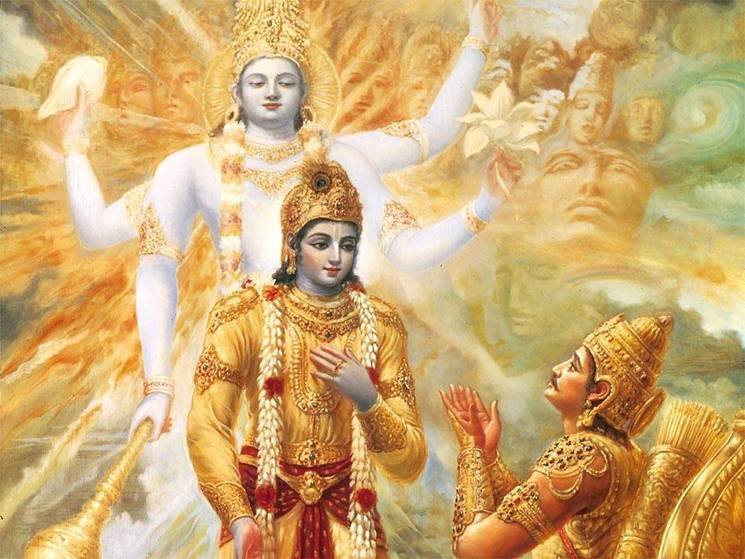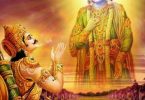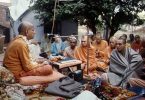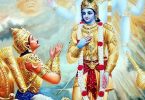Question: In Mahabharata Arjuna asks Krsna after the Kuruksetra battle to retell Bhagavad-gita again since he forgot it. Krsna states that He can’t do it: “I cannot discourse on it again in detail. I discoursed to thee on Supreme Brahma, having concentrated myself in Yoga.” How to understand it?
Written by Romapada Swami: Mahbharatha has two levels – dharma and paradharma (bhakti). While on the dharma level Krsna plays the role of a king who sometimes breaks promises, gets cursed, forgets things, etc., on the paradharma level this is all understood to be His lila. He’s the Supreme Lord. Sometimes the lila is meant to confuse unqualified individuals.
Madhvacarya comments in Mahabharata-tatparya-nirnaya on the apparent imperfections of the Lord in His appearances in this world:
“Hari Himself, for the delusion of the Daityas, shows sometimes ignorance, or dependence, or pain, or dismemberment, or the possession of a physical body, or the loss of it, etc., or want of capacity or suffering, or equality with, or even inferiority to others.” (1.38-39)
“Though this Hari is the Lord of the Devas, and controls the entire universe, still He always does act like a feeble agriculturalist. With clouded mind, He does not know Himself; sorrowful, He searches for Sita; He was bound by Indrajit; all this and more is His play for deluding the Asuras. He becomes senseless by instrumental blow and has His skin cut, and blood flows. Not knowing Himself, He asks others; leaving His body, He departed to heaven. The Lord displayed all this though it didn’t really exist, as if He were an actor, for the delusion of the Asuras. The devas knew this to be false.” (2.81-84)
Aside from this, Madhvacarya declared the extant Mahabharata largely unreliable in his Mahabharata tatparya nirnaya:
kvacid granthAn praksipanti kvacid antaritan api
kuryuh kvacic ca vyatyasam pramadat kvacid anyatha 2.3
In some places (of the Mahabharata) verses have been interpolated and in others, verses have been omitted in some places, the verses have been transposed and in others, different readings have been given out of ignorance or otherwise.
anutsanna api grantha vyakula iti sarvazah
utsannah prayazah sarve kotyamzo ‘pi na vartate 2.4
Though the works are really indestructible, they must be deemed to be mostly altered. Mostly all of them have disappeared and not even one crore (out of several crores of slokas) now exists.
Note—The Moola Ramayana consisted of 100 crores of slokas; Pancaratra consisted of 50 crores; Mahabharatha, of 60 lakhs of slokas; other Puranas, of 4 lakhs.
grantho ‘pyevam vilulitah kimv artho deva durgamah
kalav evam vyakulite nirnayaya pracoditah 2.5
harina nirnayan vacmi vijanams tat prasadatah 2.6
zastrantarani sajjanan vedamz casya prasadatah
deze deze tatha granthan drstva caiva prthag vidhan 2.7
When the original work itself is so altered, what is there to say of its meaning which is intelligible (even) to the Devas only with difficulty.
When the work had thus become altered in the Kali age, under the direction of Hari for its clear understanding, I shall state the settled truths having known them through His grace, and also having well known the other (extinct) works and all the Vedas through His grace, and also having examined the various editions existing in several places.
[One could also claim that the current Mahabharata is not related to the end of the last Dvapara yuga events but to those from a previous, unspecified Dvapara yuga. This is e.g. seen from the differences in the story of king Pariksit at its beginning, in Astika Parva (a subsection of Adi Parva) as opposed to the one in Bhagavata Purana.]
Question: What is the purpose of this, esp. for a common jiva?
Written by Romapada Swami: Sastra has these checkpoints to distinguish individuals with pious and devotional attitude from those with impious and atheistic ones. Atheists don’t bother to study sastra from a guru and thus will use such statements as reasons to reject sastra. The intelligence for this is also given by the Lord (BG 15.15). In this way, they’ll remain in samsara (BG 16.19). Only the compassion of devotees like Srila Prabhupada and his genuine disciples can prevent this.
God’s delusion (of asuras) is real, as per BG 16. Deluded asura is put into a school of hard knocks in asuric lifeforms since he refuses to learn any other way that imitating God (isvara bhava) won’t make him happy. So it’s also a sort of grace, ‘the hard grace for the stubborn’. Common jiva isn’t so stubborn so he gets lesser karmic reactions. “As all surrender unto Me, I reward them accordingly. …” (BG 4.11) is explained by Visvanatha Cakravarti Thakura as Krsna owning all margas (karma, jnana, yoga, bhakti) and giving results to every one according to actions.







